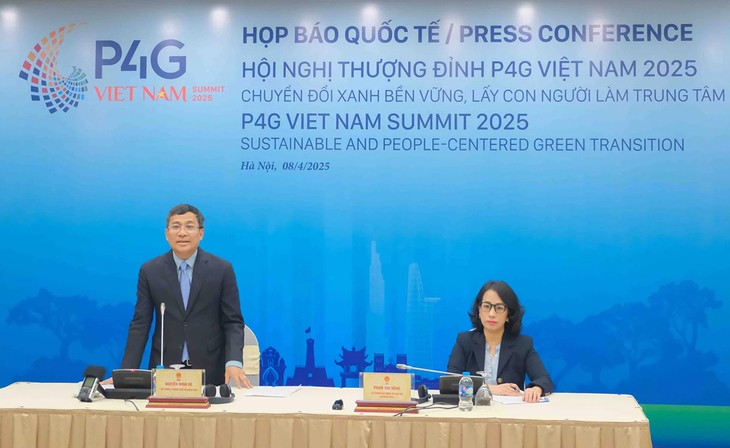(VOVWORLD) - The summit of Partnering for Green Growth and the Global Goals 2030 (P4G) is underway in Hanoi this week. The pursuit of green growth and the global goals is facing multiple challenges and demanding a more flexible and decisive approach.
 Deputy Foreign Minister Nguyen Minh Vu chairs the press conference on P4G Vietnam Summit. (Photo: baoquocte.vn) Deputy Foreign Minister Nguyen Minh Vu chairs the press conference on P4G Vietnam Summit. (Photo: baoquocte.vn) |
Themed “Sustainable and People-Centered Green Transition”, this year’s P4G Summit is expected to generate fresh momentum for countries’ efforts in green transition and sustainable development, especially at a time when global attention and investment in this field appear to be waning.
The risk of sustainable development going off track
At the UN Summit on Sustainable Development Goals (SDGs) last September in New York, UN officials presented alarming figures showing that most of the 17 SDGs set to be achieved by 2030 – including those related to green growth – might not be achieved. UN Secretary-General Antonio Guterres said the main reasons are the lack of financial and technological support from developed countries to developing countries and ineffective cooperation between countries and between the public and private sector.
“Sustainable development goals represent a bold vision, a commitment to a better, healthier, safer and more prosperous and sustainable future. But four out of five SDG targets are off track,” said Guterres.
UN Deputy Secretary-General Amina Mohammed pointed out another paradox that although renewable energy sources are becoming cheaper and more accessible, the green transition remains increasingly unequal. Poorer developing countries still face major obstacles in greening their economies and moving toward sustainable growth. She said: “We are in the midst of a quiet revolution. The way we power our economies and societies is changing. Renewables have never been cheaper or more accessible, and the acceleration in their roll-out is staggering but uneven. There is a danger that the clean energy transition could reproduce and amplify inequalities of the past: with developing countries — rich in the renewables critical to the transition — banished to the bottom of those value chains, their people are exploited, and their environment in jeopardy as others grow wealthy on their resources.”
Rebecca Grynspan, Secretary-General of the United Nations Conference on Trade and Development (UNCTAD), said that developing and least developed countries (LDCs) play a minor role in greenhouse gas emissions, collectively accounting for less than 4% of global carbon emissions, but they are among the most affected by climate change. Therefore, cooperation mechanisms and financial support for green growth and sustainable development initiatives should be reformed. These nations still hold untapped potential, particularly in developing carbon credit markets through forestry, agriculture, and renewable energy projects.
P4G and new approaches
Founded in 2017 at the initiative of Denmark, the P4G forum aims to align policies, promote public-private partnerships, and connect governments, businesses, and social-political organizations to foster green growth and support the achievement of SDGs by 2030. P4G currently focuses on reducing food loss and waste; smart agriculture adapted to climate change; sustainable water resources; renewable energy; and zero-emission transportation.
Since its launch, P4G has achieved notable results, including establishing more than 100 partnerships, mobilizing more than 100 million USD of investment in small and micro enterprises combatting climate change, cutting approximately 10.8 million tons of CO2 emissions, and affecting more than 1.6 million people globally.
What sets P4G apart is its multi-dimensional approach and strong emphasis on localized solutions. P4G prioritizes financial and technical support for small and micro enterprises tackling climate change in low- and middle-income countries and turns these enterprises into potential investment projects that deliver practical solutions to local communities on a medium or small scale. This approach can partially address the long-standing issue of unimplemented global commitments, particularly on climate finance.
The fourth P4G Summit in Vietnam is expected to elevate cooperation mechanisms to a new height and serve as a catalyst for green growth and sustainable development. According to P4G Executive Director Robyn McGuckin, the summit comes at a critical time when global climate efforts have shown signs of stalling, and Vietnam offers an ideal setting to reignite these efforts.
“Vietnam is positioned so well in the innovation entrepreneurship and tech sectors. Vietnam has some of the key elements for success that are able to really bridge that next step in their economic development. First and foremost is a young and very entrepreneurial and very hard-working population. Second is the manufacturing capability that's been built up not only in the more traditional industry that we think of for domestic and export purposes, but also in the higher tech industry in some of the key components for electric vehicles, batteries, and AI,” said McGuckin.
The P4G Summit in Vietnam is scheduled to adopt the Hanoi Declaration, reaffirming countries’ commitments to people-centered, green, and sustainable growth.